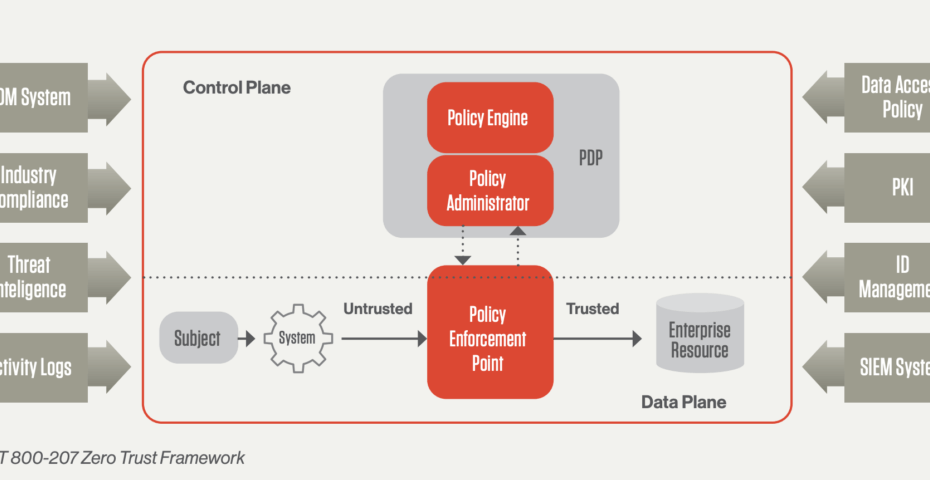Traditionally, protecting valuable IT resources like user data and intellectual property was heavily based on perimeter security strategies. The IT industry dominated the operational business world with firewalls and other network-based security elements and tools. These security strategies were mainly used to inspect and provide authentication & validation for users going in and out of the network firewall.
Fast forward to the modern-day and age, businesses and organizations have been forced to shut down their brick and mortar operations and fully embrace a forced digitalization. As this increased remote work access, creating a requirement for a smoother IT structure – it turns out Zero Trust has been around all along. Given the amount of data processing, the move to hybrid cloud infrastructure was inevitable.
According to a Deloitte survey poll, almost 40% of IT security professionals say that the lockdown allowed their organizations to speed up their efforts of acquiring Zero Trust. After all, it was quite evident that depending on network perimeter security structures is no longer sufficient. As organizations continued to experience security threats, disruptions in business operations like supply chain, disaster recovery, and recurrent cyberattacks, it was high time we found a structural hybrid between the traditional open and closed IT ecosystems.
Unlock the future of intelligent applications with our cutting-edge Generative AI integration services!
The Pre-Pandemic IT Ecosystem
The pre-pandemic IT environment was the relatively closed-up security structure designed by the department to work for multiple devices in a single working environment. The main security zones of trust structure would allow the users to generate strong user authenticity and validation prospects through VPNs. However, on the individual level, internal networking for both the users and the services provided minimal authentication. For instance, usernames and passwords.
Relatively Open IT Ecosystem
In comparison to the closed security structure that was traditionally in place and being used mainly within organizations before the Covid-19 pandemic – the general immediate lockdown brought on changes within the ecosystem. The circumstances required a quick fix for the time being, so without relying on any VPN with minimal perimeter layers in place, a relatively open IT environment was created. Services were conducting the main functions of access to applications like Google Authenticator or other cryptographic mechanisms.
The Hybrid of the Two – Zero Trust
Soon enough, finally, when the IT technicians and the experts could come around to deducing a way to merge both the relatively open and close structural IT ecosystems, they concluded using Zero Trust. Zero Trust has been around for quite some time but has recently gained recognition as the new IT buzzword amongst professionals and organizations. Basically, Zero Trust is a hybrid security framework containing elements from both relatively open and close environments. It requires all the users, whether they are within or from outside the organization’s network, to be authorized, validated, and continuously require authentication for security configuration purposes. It is like a mandated part of all the steps that need to be taken before being granted and allowed to keep access to the company’s data and applications.
Why Is Zero Trust The Answer?
The following are some of the main reasons why Zero Trust has proven to be the choice for organizations that were forcefully digitalized after the Covid-19 lockdown and have now found ways to run business operations smoothly.
1. Modern Technology
Zero Trust is based on the assumption that no traditional network edge per se limits security access. Under Zero Trust, networks can present in the cloud, localized, or hybrid these resources with the users present in any location. That is what makes Zero Trust the modern technology framework that can easily secure infrastructural inputs and data for the modern-day challenges presented with doing business remotely.
2. Much Needed Protection
Zero Trust is basically a strategic preemptive security initiative that found it is coming with the Covid-19 lockdown. The forceful digitalization of businesses had put security accesses in overdrive. So if it wasn’t for Zero Trust successfully eliminating data breaches via mitigating the general concept of trusting the organization’s network edge – we still wouldn’t have come around working normally despite things going haywire.
3. Architectural Framework
In Zero Trust architecture, you recognize a protective surface that is made up of the network’s vital data application servers known as DAAS. These protect surfaces pertain to each organization, containing some of the most critical and valuable company operations. This can easily mean that we are putting the company at considerable risk with almost any other platform besides Zero Trust.
4. Expansion of Remote Access
Zero Trust has allowed the business to expand its remote working potentials so much that many organizations don’t want to look back and go back to their traditional ways of operating. Because Zero Trust can run many business applications while opening up access at an exceptional speed for others, the expansion of remote excess to business networking and data has become easier than ever.
5. Minimum Requirements
One of the best parts about acquiring Zero Trust is that it works with generic IT minimum requirements like data, devices, user identity, network identity, analytics, automation, visibility, workloads, orchestration, network, and endpoint. Basically, all the broader spectrum of a general IT ecosystem security capabilities and experiences coming into account but much more advanced and tailored for each organization’s user and data size.
Summary of Zero Trust Better Than Lock Down
Implementing Zero Trust might have been one of the better things to come out of the Covid-19 lockdown. If executed rightfully, Zero Trust allows organizations to speed up their business processes while almost guaranteeing their connection is highly authorized through one of the best security systems out there. Based upon these points, we answer is zero trust better than lock down?
For further information on the question is Zero Trust Better Than Lock Down, contact us at Cloud Computing Technologies.
Further blogs within this Chrome And VS Extensions category.




